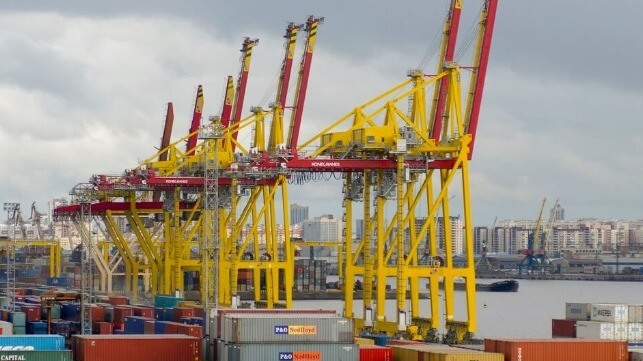Maersk: European Terminals are Refusing Russian Cargoes

When most large ocean carriers suspended normal service to Russia this week, shipping options for the nation's trade with the outside world were radically curtailed - and service levels are still deteriorating, according to Maersk Line. The number-two carrier was still planning to accept food, medications and humanitarian cargo to Russia, but it has been forced to partially suspend that service as well.
"An increasing number of our terminal service providers in Europe are advising us that they will no longer be able to handle any additional cargo originating or destined for Russia, including transshipments," Maersk said in a statement. "As the stability of our operations and our customers’ cargo is critical, we are now also temporarily stopping acceptance of all new Maersk bookings to/from St. Petersburg, Kaliningrad and Novorossiysk, regardless if the cargo is food, medical or humanitarian."
Humanitarian cargo bound for Far East Russia is not affected by the terminal difficulties in Europe, the line said.
For affected cargoes already at the terminal or en route, Maersk is looking at alternative options to provide delivery, and it is encouraging affected customers to consider a free change-of-destination service for Ukrainian and Russian cargo bookings. It has also extended the start date for D&D charges for affected cargoes.
For customers who do not wish to change their booking for cargo that is on its way to Russia and Ukraine, the line will not charge hub storage fees, though it may have to move stored containers to other seaports in order to ease yard congetsion.
In the medium term, sanctions measures covering the majority of Russian banks will complicate the remaining commerce between Russia and the West. The implications may be global.

that matters most
Get the latest maritime news delivered to your inbox daily.
"Maritime trade with Russia and Russian businesses could be very difficult in the months and even years to come," said Christian Roeloffs, CEO of leasing firm Container xChange. "We expect this awful war to add to the stretched nature of global container supply chains, bringing yet more inflation, disruption and delays."
Top image: STS cranes at the Port of St. Petersburg (file image courtesy Andrew Shiva / CC BY-SA 4.0)
